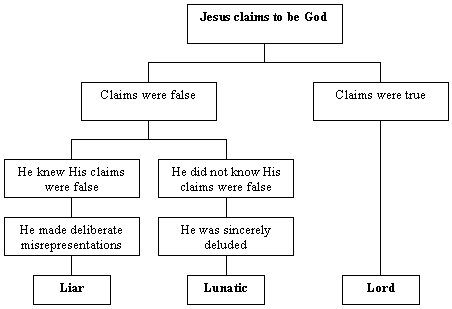 |
| "The alleged bodily resurrection of Jesus, if true, was very consequential concerning mankind's most fearful and important questions." |
 |
 |
|
|
 |
The Unrivaled Resurrection
What do some of the world's greatest lawyers say about the event that changed history from BC to AD?
Resurrection Reasoning - Part 6
Ultimately, given the things Jesus said, it must logically
follow that He was either a liar, a lunatic, or truly God — for
the New Testament records the following about Jesus: He
claimed that God was His Father, and He claimed to be one
with His Father (Matt. 11:27; John 5:16–18; John 10:30).
He claimed to be the I AM (“I AM” is a name for God in the
Old Testament; see John 8:51–58; Exod. 3:14). He claimed
to come forth from God (John 3:13, 8:23, 42). He claimed
to be the only access to God, His Father (John 14:6–7). He
claimed to be able to forgive sins (Matt. 9:2–7). He claimed
to be the judge of all mankind and to dishonor Him was to
dishonor God His Father (John 5:22–23). He claimed to have
had glory with His Father before the world began (John 17:5).
He accepted worship (Matt. 14:33; John 20:28–29). The authenticity
of these sayings of Jesus is quite certain, as they
would have proved fatal to any fabrication or myth: most of
these sayings are blasphemous to Jewish tradition today, and
would have been also in the first century. Since the Apostles
were trying to convince the Jews that Jesus was the prophesied
Savior (or Messiah) of the Old Testament, it would have
been impossible to make their case by attributing to Him
such blasphemy. Indeed, the Gospels show that it was precisely
these “blasphemous” claims that infuriated the Jewish
leaders (John 8:58–59; Matt. 9:2–3), ultimately resulting in
Jesus’ crucifixion.
Thus, Jesus was either telling the truth or not, as the
following flowchart illustrates:

The issue with these three alternatives is not which is
possible, for it is obvious that all three are possible. Rather,
the question is, “Which is more probable?” To conclude logically
that Jesus was a liar or lunatic, however, doesn’t coincide
with what is known either of Him or the results of His life
and teachings. Everything about Jesus’ life indicates that He
is a perfect model of sanity and decency. Indeed, scholars,
non-Christians, and even atheists throughout history have
acknowledged the moral superiority of Jesus. As the worldrenowned
Canadian agnostic Charles Templeton states, “Jesus
was a moral genius. He was the intrinsically wisest person
that I’ve ever encountered in my life or in my readings. . . .
There’s no question that He had the highest moral standard,
the least duplicity, and the greatest compassion of any human
being in history.”[]
There are yet two more factors that must also be accounted
for: (1) some people have claimed to be God, but most have not; and (2) some people are regarded as sages (i.e., they possessed
great wisdom), but most are not. These points seem
strange, but their significance is clarified in the following four
possible combinations: (1) There are those who have not claimed
to be God and are not regarded as sages — this accounts for
most people who have ever lived; (2) There are those who have
not claimed to be God but are regarded as sages — examples
would be people such as Moses, Socrates, and Plato; (3) There
are those who have claimed to be God but are not regarded as
sages. These people have generally been regarded as insane —
David Koresh would be an example; (4) There are those who
have claimed to be God and are regarded as sages. Only one
person in history fits this category — Jesus Christ. Thus, Jesus
imposes himself upon mankind and forces each person to a
decision about who he or she thinks He is. (See chart below.)
| |
|
Claimed To Be God |
| |
|
No |
Yes |
Regarded as
Sage |
No |
Most People |
Insane |
| Yes |
Moses,
Socrates,
Plato |
Jesus |
In the end, the latest critical attempts to undermine the
traditional, literal interpretation of the Gospels have been
shown to be highly unfounded. Although gaining popularity
in the media, radical New Testament critics have unfortunately
misconstrued the facts surrounding the historical resurrection
of Jesus. Conservative and even many liberal scholars today
have been able to show that the latest historical and
archaeological research tends only to strengthen the conclusions
of some of history’s greatest lawyers.
Concluded Tom Anderson, former president of the California
Trial Lawyers Association and one of today’s top ten trial lawyers,
“You see, my four-month study was motivated to find a
loophole, any loophole, in the truths of Christ. Finding none
frightened me."[] Similarly, Simon Greenleaf, who produced
possibly the greatest single authority on evidence in the entire
literature of legal procedure, concluded that it is “impossible
that the Apostles could have persisted in affirming the truths
they had narrated, had not Jesus Christ actually risen from
the dead.”[]
And Sir Lionel Luckhoo, whose 245 consecutive
murder trial victories earned him a place in The Guinness
Book of World Records as the world’s most successful lawyer,[]
concluded that “the evidence for the resurrection of Jesus
Christ is so overwhelming that it compels acceptance by proof
which leaves absolutely no room for doubt.”[]
[]
|